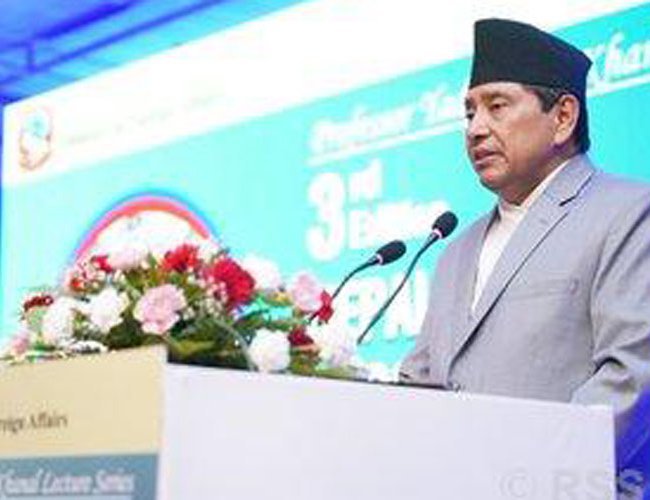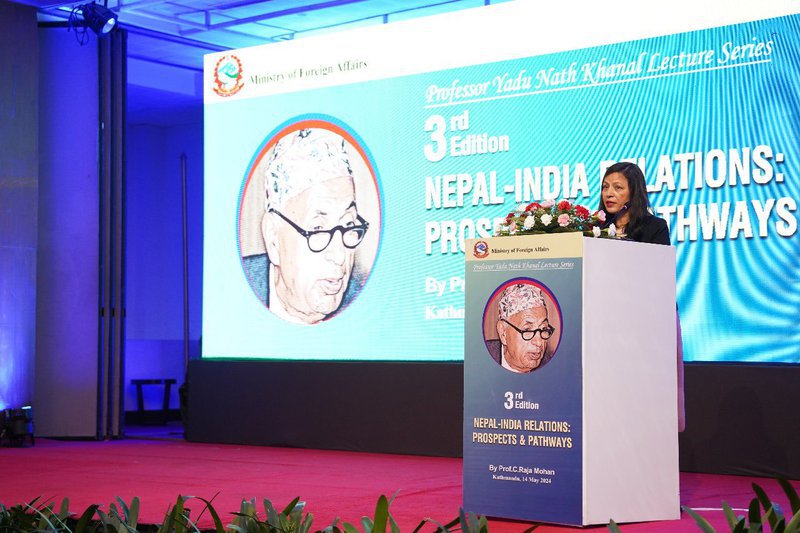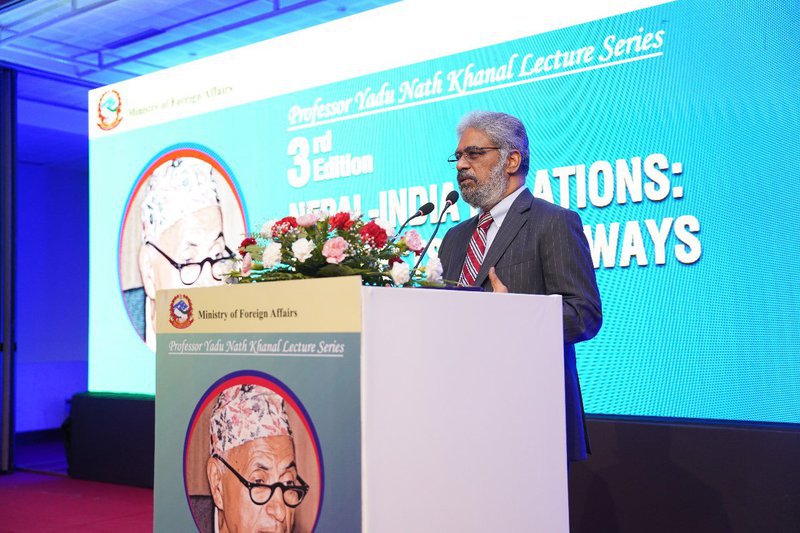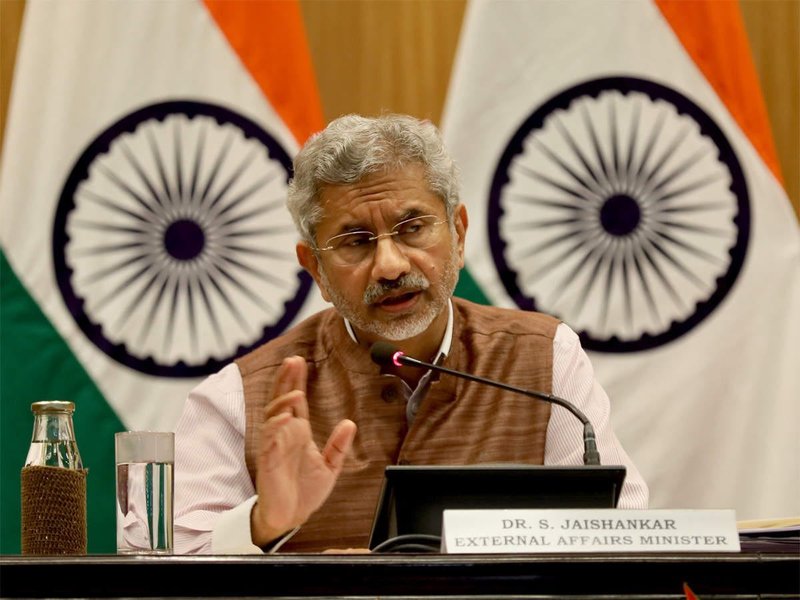
India is currently in the final phase of its General Elections for parliament, while Nepal is facing various challenges such as reviving its economy and resolving political deadlock. In the midst of these issues, Nepal's communist-led coalition government, backed by CPN-UML leader Oli, has made the controversial decision to print 100 rupees notes featuring the new map of Nepal. This decision has sparked a major diplomatic dispute with India.
Prime Minister Pushpa Kamal Dahal Prachanda's government, under pressure from Oli, has no choice but to endorse the decision in order to appease him and maintain stability. It is no secret that former prime minister Oli supports the printing of the new notes. Despite India's objection, Oli has defended Nepal's right as a sovereign and independent country to make its own decisions.
However, the decision to publish notes with the new map has raised many questions, even leading to the resignation of Dr. Chiranjibi Nepal, President Ram Chandra Poudel's Economic advisor and former Governor of Nepal Rastra Bank, due to his critical opposition at this particular time.
FM Shrestha’s Initiative
The ongoing dispute between Nepal and India has prompted Deputy Prime Minister and Foreign Minister Narayan Kazi Shrestha to take action to resolve the deadlock.
During the Third edition of Prof. Yadu Nath Khanal Lecture Series in Kathmandu on 14 May 2024, DPM Shrestha emphasized that Nepal's relationship with India is unique compared to any other country.
Initially launched three years ago by the former foreign secretary and current ambassador of Nepal to Canada Bharat Raj Paudyal, with support from the former chief Secretary Shanker Das Bairagi, the current foreign secretary Sewa Lamsal is continuing Nepal's flagship program.
In the presence of distinguished individuals from various sectors of national life, DPM and Minister for Foreign Affairs Shrestha highlighted the longstanding history of mutual friendship and cooperation between Nepal and India as close neighbors.
The minister highlighted several key aspects of the Nepal-India relationship, including their close proximity, shared religious, cultural, and linguistic ties, strong economic engagement, and thriving people-to-people connections. He emphasized that these ties are nurtured by nature, bound by cultural affinity, and are comprehensive, multi-dimensional, and incomparable.

However, he acknowledged that there are historical bilateral issues that still need to be resolved through dialogue and diplomatic channels, based on historical facts and in the spirit of good neighborliness. It is worth noting that the third series of lectures, which focused on Nepal-India relations, coincided with a challenging period in the relationship, with Prof C Rajmohan, former Director of the Academy of South Asian Studies, serving as the keynote speaker. In the previous series, Professor Dr. Surya Subedi and former foreign secretary Madhuraman Acharya were invited as keynote speakers.
Minister Shrestha emphasized that this initiative has paved the way for elevating Nepal-India relations to unprecedented heights, a commitment that the Government of Nepal firmly upholds. He reiterated that the foundation of these bilateral relations is built upon principles of sovereign equality, peaceful coexistence, goodwill, mutual trust, and understanding.
Furthermore, Minister Shrestha highlighted that the exchange of high-level visits has significantly contributed to strengthening the relations and fostering partnerships across various sectors. He also mentioned the establishment of a consultative mechanism, which has effectively facilitated cooperation in multiple areas of bilateral relations, thereby enhancing mutual cooperation and partnership.
In addition, Minister Shrestha emphasized the immense potential for cooperation in various sectors that can bring mutual benefits. He specifically emphasized the importance of partnership in the energy sector, stating that the proper utilization of Nepal's abundant hydropower resources can revolutionize the development landscape of the region by promoting clean energy.
Regarding trade and transit, Minister Shrestha acknowledged the ongoing expansion of cross-border connectivity to facilitate trade. He emphasized the need for further expansion and improvement of this network, emphasizing that both countries should explore ways to make mutual trade more profitable.
Lastly, Minister Shrestha highlighted the attractiveness of Nepal as an investment destination, noting that multinational companies have withdrawn their investments from other countries to invest in Nepal. This signifies the growing confidence in Nepal's potential and opportunities for investment.

The Foreign Minister emphasized the potential for collaboration in the field of information technology between Nepal and India. He also highlighted the importance of expanding bilateral cooperation in education, science, and technology. Additionally, he expressed that Nepal's development and economic prosperity would benefit its neighboring countries, emphasizing the desire for a peaceful neighborhood.
Professor Rajmohan pointed out that Nepal and India face similar global challenges and stressed the need for political leaders to carefully address the power struggle between powerful nations, which has negatively impacted smaller countries.
Furthermore, he noted that Kathmandu and New Delhi should take lessons from Beijing, as China has successfully improved its relations with both Russia and the USA based on their respective needs. Despite the strained relations between Beijing and Washington, its relations with Moscow remain strong.
Nepal-India relations.
Foreign policy analyst Jayaraj Acharya has expressed concern over the deteriorating relationship between Nepal and India, attributing it to the lack of diplomatic skills among the country's political leaders. Acharya believes that the government's decision to introduce new currency notes reflects immaturity in handling relations with India.
He further emphasizes that instead of resorting to cheap anti-Indian rhetoric, Nepal should focus on protecting its own interests and fostering a thriving relationship with India. Acharya suggests that Nepal needs to adopt a new approach to diplomacy, particularly considering its strategic position between two major powers. He also notes that Nepal's diplomatic influence has diminished and sees no potential benefits in maintaining its current relations with India.
The primary challenge facing Nepal's foreign policy lies in enhancing its ties with India. Shyamsharan, an Indian diplomat, delves into the intricate dynamics of the relationship between the two nations in his book. He sheds light on the issues involving Pakistan, China, and Nepal, stressing the necessity of engaging in high-level political dialogues to tackle these challenges. Shyamsharan expresses apprehension regarding the current state of affairs and underscores that India's backing for Nepal, such as in the WHO elections, hinges on the enhancement of their relationship.
Acharya underscored that Nepal garnered diplomatic significance during the reign of BP and King Mahendra owing to their charismatic personalities. Leading the nation for 51 years from 2048, Acharya outlined three pivotal factors that determine a diplomat's effectiveness. These factors form the basis for the clout wielded by politicians and diplomats. "Those possessing a greater share of these qualities exert more influence," he remarked. In contrast to common belief, geography plays a minor role in this context, as illustrated by Acharya through the example of Yadunath Khanal.
He emphasized that the key factor is not the individual's position or the country they represent, but rather their capabilities. Additionally, Acharya highlighted that Nepal's diplomatic importance is mainly due to its geographical location, with more than 100 countries being smaller than Nepal.
The decision has been made by the Nepal government to replace the old administrative map of Nepal on the Rs.100 banknotes with a new map of Nepal. Minister for Communication and Information Technology, Rekha Sharma, announced that the government has authorized the Ministry of Finance to carry out this change.
Indian Discontent
India expresses its dissatisfaction as Nepal plans to introduce a new Rs 100 currency note featuring a new map that includes territories of Limpiyadhura, Lipulekh, and Kalapani.

Dr. S. Jaishankar, the External Affairs Minister of India, has voiced his dissatisfaction over Nepal's unilateral decision. According to him, this decision does not alter the actual situation on the ground. Dr. Jaishankar emphasized that Nepal took this step while discussions were underway regarding the established mechanism between the two nations.
During the tenure of Prime Minister KP Sharma Oli, a new map of Nepal was introduced in 2077, which included territories claimed by India such as Lipulek, Limpiyadhura, and Kalapani.
This move sparked controversy and tensions between the two countries. In his article, Dipak Gyawali highlights the consequences of supporting corrupt leaders in Nepal and warns India of potential challenges ahead due to its involvement in Nepal's political landscape in his X wall.
However, Indian analysts have begun to accuse Nepal of leaning towards China. "The current actions taken by Nepal are largely influenced by its new political leadership, which is intentionally using its close ties with China to intimidate India.
Additionally, there are several other concerns that have arisen, causing worry in Kathmandu. What makes Nepal's actions particularly significant is its perceived alignment with China. In recent years, the relationship between Nepal and China has significantly strengthened, driven by mutual economic interests and strategic cooperation," states an Indian commentator.
Despite Deputy Prime Minister and Foreign Minister Shrestha's efforts to address the controversy surrounding the printing of new currency notes, the irrational and nationalist decision made by the Prachanda-led government does not serve Nepal's broader interests.
From a political and personal standpoint, individuals may hold varying opinions on Nepal-India relations. However, the reality is that Nepal and India share close geographical and cultural ties that are unbreakable.

Keshab Poudel
Poudel is the editor of New Spotlight Magazine.
- ETFC Nepal is focused on expanding distribution and transmission to the private sector: ETFC Chair Dr. Dhital
- Jul 05, 2025
- FOURTH PROFESSOR Y.N. KHANAL LECTURE: Nepal-China Relations
- Jun 23, 2025
- Colonel JP CROSS: Centenary Birthday
- Jun 23, 2025
- REEEP-GREEN: Empowering Communities with MEP
- Jun 16, 2025
- BEEN: Retrofitted For Green
- May 28, 2025












